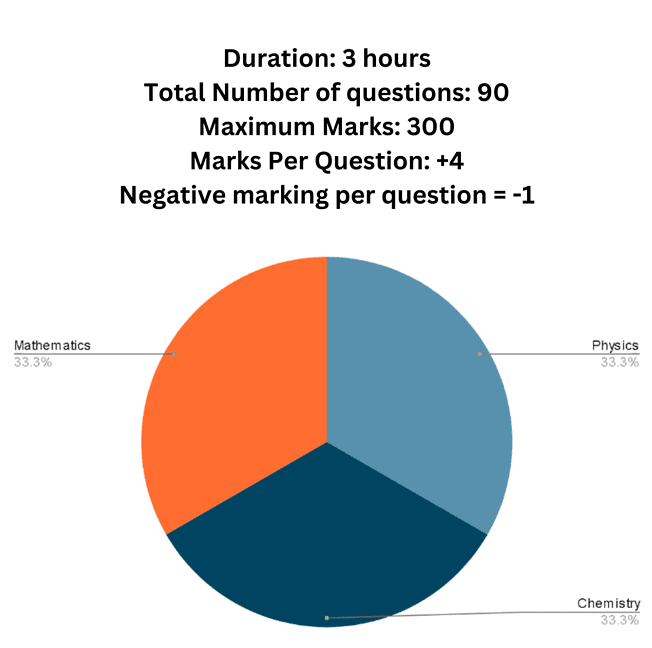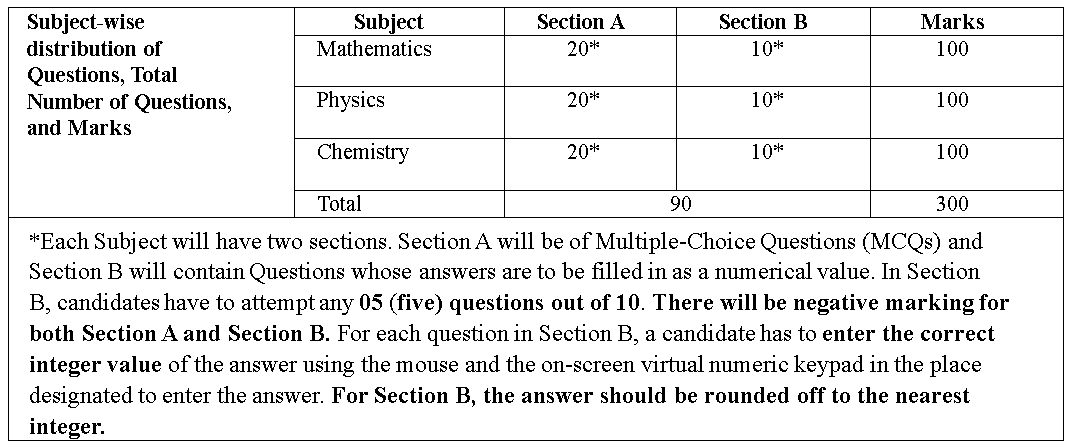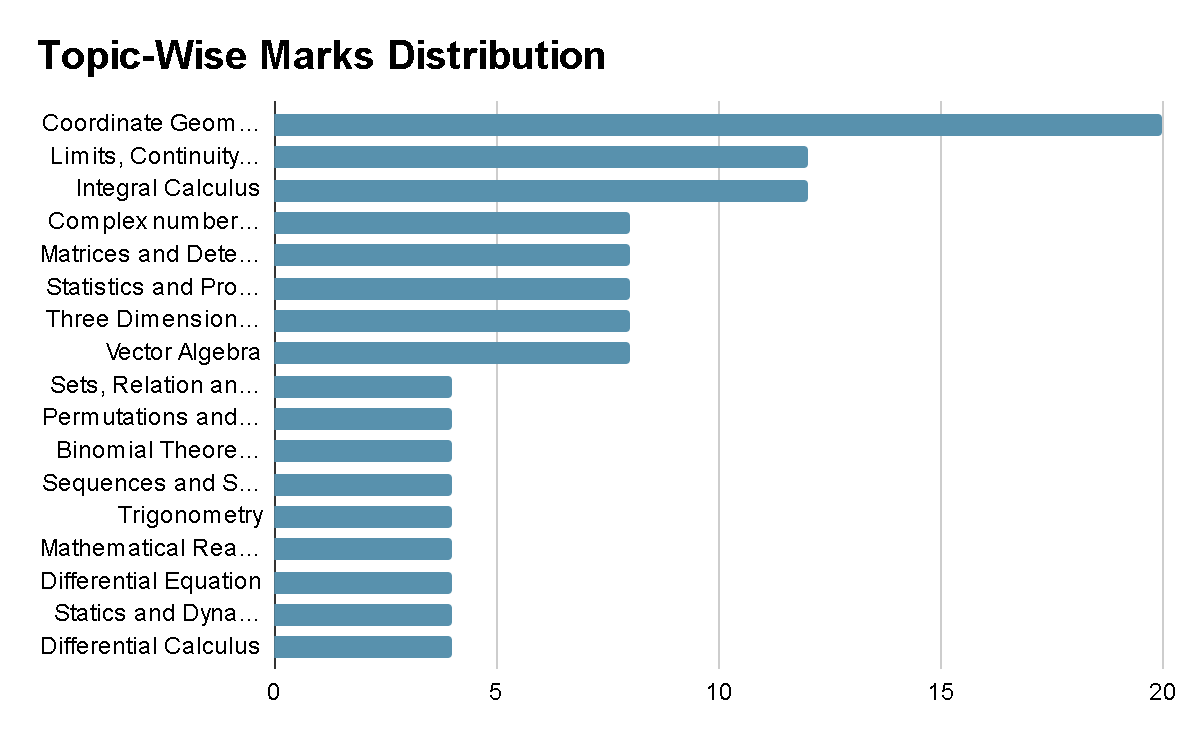JEE Main Maths Syllabus 2025
Before you start preparing, knowing what you have to study is the first step. Understanding the JEE syllabus and exam pattern correctly will guide you to properly plan your preparation.
If you are aware of the exam, pattern, and the amount of syllabus to be covered you can prepare a proper timetable and study schedule to cover all the topics. The below table represents the subject-wise distribution of questions and marks along with the guidelines for Section A and Section B.
The below table represents the subject-wise distribution of questions and marks along with the guidelines for Section A and Section B. The JEE Maths syllabus covers a wide range of mathematical concepts and topics, including algebra, trigonometry, geometry, calculus, and more. The syllabus is designed to test the student's understanding of the fundamental principles of mathematics and their ability to apply them to solve complex problems.
The JEE Maths syllabus covers a wide range of mathematical concepts and topics, including algebra, trigonometry, geometry, calculus, and more. The syllabus is designed to test the student's understanding of the fundamental principles of mathematics and their ability to apply them to solve complex problems.
Here is a general outline of the units that are included in the JEE mathematics syllabus:
Unit 1: Sets, Relations, and Functions
- Sets and their representation.
- Union, intersection, and complement of sets and their algebraic properties.
- Powerset.
- Relation, types of relations, equivalence relations.
- Functions; one-one, into and onto functions, the composition of functions.
Unit 2: Complex Numbers and Quadratic Equations
- Complex numbers as ordered pairs of reals.
- Representation of complex numbers in the form (a+ib) and their representation in a plane, Argand diagram.
- Algebra of complex numbers, modulus and argument (or amplitude) of a complex number, square root of a complex number.
- Triangle inequality.
- Quadratic equations in real and complex number system and their solutions.
- The relation between roots and coefficients, nature of roots, the formation of quadratic equations with given roots.
Unit 3: Matrices and Determinants
- Matrices: Algebra of matrices, types of matrices, and matrices of order two and three.
- Determinants: Properties of determinants, evaluation of determinants, the area of triangles using determinants.
- Adjoint and evaluation of inverse of a square matrix using determinants and elementary transformations.
- Test of consistency and solution of simultaneous linear equations in two or three variables using determinants and matrices.
Unit 4: Permutations and Combinations
- The fundamental principle of counting.
- Permutation as an arrangement and combination as a selection.
- The meaning of P (n,r) and C (n,r), simple applications.
Unit 5: Mathematical Inductions
- Principle of Mathematical Induction and its simple applications.
Unit 6: Binomial Theorem and Its Simple Applications
- Binomial theorem for a positive integral index.
- General term and middle term.
- Properties of Binomial coefficients and simple applications.
Unit 7: Sequence and Series
- Arithmetic and geometric progressions, insertion of arithmetic, geometric means between two given numbers.
- The relation between A.M. and G.M sum up to n terms of special series: Sn, Sn2, Sn3.
- Arithmetico-Geometric progression.
Unit 8: Limit, Continuity, and Differentiability
- Real-valued functions, algebra of functions, polynomials, rational, trigonometric, logarithmic and exponential functions, inverse functions.
- Graphs of simple functions.
- Limits, continuity, and differentiability.
- Differentiation of the sum, difference, product, and quotient of two functions.
- Differentiation of trigonometric, inverse trigonometric, logarithmic, exponential, composite and implicit functions; derivatives of order up to two.
- Rolle’s and Lagrange’s mean value theorems.
- Applications of derivatives: Rate of change of quantities, monotonic increasing and decreasing functions, Maxima, and minima of functions of one variable, tangents, and normal.
Unit 9: Integral Calculus
Indefinite Integrals: Integral as an antiderivative, Fundamental Integrals involving algebraic, trigonometric, exponential, and logarithmic functions. Integrations by substitution, by parts, and by partial functions. Integration using trigonometric identities. Evaluation of simple integrals of the type
Integral as the limit of a sum. The fundamental theorem of calculus
Definite Integrals: Properties of definite integrals. Evaluation of definite integrals, determining areas of the regions bounded by simple curves in standard form.
Unit 10: Differential Equations
- Ordinary differential equations, their order, and degree.
- Formation of differential equations.
- The solution of differential equations by the method of separation of variables.
- The solution of a homogeneous and linear differential equation of the type: dy/dx + P(x)y = Q(x)
Unit 11: Co-ordinate Geometry
- Cartesian system of rectangular coordinates in a plane, distance formula, section formula, locus, and its equation, translation of axes, the slope of a line, parallel and perpendicular lines, intercepts of a line on the coordinate axes.
- Straight lines: Various forms of equations of a line, intersection of lines, angles between two lines, conditions for concurrence of three lines.
- Distance of a point from a line, equations of internal and external bisectors of angles between two lines, coordinates of the centroid, orthocentre, and circumcentre of a triangle, equation of the family of lines passing through the point of intersection of two lines.
- Circles, conic sections: Standard form of the equation of a circle, the general form of the equation of a circle, its radius and centre, equation of a circle when the endpoints of a diameter are given, points of intersection of a line and a circle with the centre at the origin and condition for a line to be tangent to a circle, equation of the tangent.
- Sections of conics, equations of conic sections (parabola, ellipse, and hyperbola) in standard forms, condition for y = mx + c to be a tangent and point (s) of tangency.
Unit 12: Three-dimensional Geometry
- Coordinates of a point in space, the distance between two points.
- Section formula, direction ratios and direction cosines, the angle between two intersecting lines.
- Skew lines, the shortest distance between them and its equation.
- Equations of a line and a plane in different forms, the intersection of a line and a plane, coplanar lines.
Unit 13: Vector Algebra
- Vectors and scalars, the addition of vectors, components of a vector in two dimensions and three-dimensional space.
- Scalar products and vector products, and vector triple product.
Unit 14: Statistics and Probability
- Measures of Dispersion: Calculation of mean, median, mode of grouped and ungrouped data calculation of standard deviation, variance and mean deviation for grouped and ungrouped data.
- Probability: Probability of an event, addition and multiplication theorems of probability, Baye’s theorem, probability distribution of a random variate, Bernoulli trials, and binomial distribution.
Unit 15: Trigonometry
- Trigonometrical identities and equations.
- Trigonometrical functions, inverse trigonometrical functions, and their properties.
- Heights, and distance.
Unit 16: Mathematical Reasoning
- Statement logical operations and, or, implies, implied by, if and only if, understanding of tautology, contradiction, converse, and contrapositive.
JEE Main Maths Chapter Wise Weightage
The syllabus for mathematics in the Joint Entrance Examination (JEE) covers various topics from algebra, trigonometry, geometry, and calculus. The weightage of each topic in the JEE may vary from year to year.
The general weightage of topics covered in JEE Main Mathematics is as follows:
 From the above data, we can conclude that topics like Coordinate Geometry, Limits, Continuity and Differentiability, and Calculus have a higher weightage compared to other topics. These topics require a deeper understanding of mathematical concepts and are heavily tested in competitive examinations.
From the above data, we can conclude that topics like Coordinate Geometry, Limits, Continuity and Differentiability, and Calculus have a higher weightage compared to other topics. These topics require a deeper understanding of mathematical concepts and are heavily tested in competitive examinations.
EduRev experts have identified certain important topics in mathematics to be essential for success in the JEE Mains exam. These are sort of do-or-die chapters and can’t be left at any cost.
For an in-depth understanding of the topic-wise and chapter-wise weightage of JEE Main Maths, along with the types of questions asked in the exam from each topic, refer to the article or video by EduRev expert on "Most Important Topics for JEE Main Maths".
JEE Maths Study Material
JEE Maths study material includes a variety of resources such as textbooks, lecture notes, online tutorials, PYQs, and practice problems. It is important to use high-quality materials that align with the JEE syllabus and exam format.
EduRev offers a comprehensive range of courses to help you prepare for the JEE Mathematics Section. Each course listed below is tailor-made to help you gain the knowledge, skills, and confidence required to succeed in the JEE Mathematics Section.
- Course on JEE Mathematics
- Crash course for JEE
- JEE Main & Advanced Mock Test Series
- Daily Practice Problems for JEE Mains / Advanced
- Maths 35 Years JEE Main & Advanced Past Year Papers
- NCERT Exemplar & Revision Notes for JEE
- Mind Maps for JEE
- All types of questions
- Formula Sheets for JEE
- Online MCQ Tests for JEE
- PPTs for JEE Preparation
- JEE Revision Notes
How to prepare for JEE with EduRev Infinity?
EduRev Infinity Package for JEE includes:
- Subject-wise Courses: Courses for all the 3 subjects: Physics, Chemistry, and Mathematics. Each course offers topic-wise video lectures, detailed notes & online tests for each topic.
- Guidance book and Revision Notes: With the EduRev Infinity access, you can have access to the NCERT Exemplar and JEE Revision Notes so that you can save time and effort in finding the best learning resources.
- Solutions for Reference Books: EduRev’s Infinity package for JEE also includes solutions for reference books like HC Verma, DC Pandey, and Irodov.
- Discussion forum: Along with the learning, you can get your doubts solved with the help of the discussion forum; the largest community of teachers and students to help you all the time.
- Previous Year Question Papers: You will get solved previous year question papers for Physics, Chemistry, and Mathematics, as well as topic-wise solved PYQs for JEE Mains and Advance which have appeared in the last 35 years.
- Daily Practice Problems: To get a better understanding of different types of questions, you can refer to the Daily Practice Problems for JEE Mains and Advanced available in EduRev’s Infinity package.
- Mock Test Series for JEE preparation: EduRev provides Mock Test Series for JEE Mains and JEE Advanced, which includes over 160 mock tests including part-test which helps you prepare particular topics better.
- Test Analysis: You will get a comprehensive analysis of the tests you attempted, with in-depth solutions to each question. You will also gain insight into your performance relative to other test-takers, with an All India Rank, to identify your strengths and weaknesses.
- Revision Material: EduRev offers comprehensive revision notes, formula sheets, mind maps, and PPTs for quick and easy last-minute revisions.
- Crash course: If you have limited time, EduRev also provides a crash course for JEE preparation with detailed and structured video lectures.
JEE Main Maths Best Books
Here are some books/resources that are often recommended by IIT toppers for mathematics:
- Course in Mathematics for IIT JEE, Tata McGraw Hill publications
- Problems Plus in IIT Mathematics, A Das Gupta
- 35 Years Chapter-wise Solved Papers and Tests by EduRev
- Class 11th & Class 12th Mathematics, R.D. Sharma
- IIT Mathematics, M.L. Khanna
Topic Wise Books:
- Higher Algebra by Hall and Knight
- Problems in Calculus of One Variable by I.A. Maron
- Problems in Mathematics by V.K. Krishnamurthy and R.
- DPP for JEE Main and Advance by EduRev
- Calculus by Michael Spivak
- Trigonometry by S.L. Loney
- Coordinate Geometry by S.L Loney
- Differential Calculus by Shanti Narayan and P.B. Malik
- Integral Calculus by Shanti Narayan and P.B. Malik
Pro Tip:
For example, If you are studying Trigonometry:
Step 1: Start from NCERT and NCERT Exemplar,
Step 2: Complete the book exercises,
Step 3: Practice basic questions from the Practice Problems offered by EduRev or by using a reference book like S.L. Loney.
Step 4: Test and assess your understanding by giving topic-wise tests available in the JEE Mathematics course or with the help of books like ML Khanna.
EduRev has prepared the article on Best Books for JEE Maths providing a list of recommended books by IIT JEE Toppers along with a detailed description of the books and their authors.
JEE Maths Practice Tests
Practice tests are an essential part of preparing for the exam. It gives candidates a better understanding of the type of questions that appears in the exam, enabling them to better prepare. Hence, it is recommended to take tests after completing a topic or a chapter to gain a better understanding of your knowledge on the topic.
At EduRev's exclusive course for JEE Mathematics, you can find 300+ tests that you can attempt after completing each chapter. Additionally, you can retake the questions that you answered incorrectly or left unanswered.
JEE Main Previous Year Questions for Maths
PYQs are extremely important for preparing for the JEE Exam as they provide valuable insight into the type of questions that are likely to be asked in the exam. PYQs also help to improve the speed and accuracy of solving problems, which is crucial for the JEE which is a time-bound test, and also, helps to improve time management skills.
Pro Tip: After completing a chapter, practice its previous year's questions to gain a better understanding of the question pattern which is followed in the JEE Exam.
Hence, EduRev provides a wide collection of question papers for JEE Maths including year-wise and topic-wise papers so that candidates can access all of them in one place. JEE candidates need not visit separate pages for different questions.
Mock tests are an important part of preparing for IIT JEE Exam. They provide students with an opportunity to practice taking the exam in a simulated environment, which can help them become more familiar with the format and structure of the actual examination. Additionally, mock tests can help students identify areas where they need to improve and focus their studies. Overall, mock test series are an essential tool for preparing for competitive exams, as they can help students become more confident and well-prepared for the actual test.
EduRev provides Mock Test Series for JEE Mains and Advanced, which includes over 160 mock tests including part-test which helps you prepare particular topics better. Additionally, it provides you with the scorecard after each test by which you can identify your strong and weak points.
Frequently Asked Questions(FAQs) on JEE Main Maths Syllabus 2025
Is JEE Maths Hard?
The difficulty level of JEE math can vary depending on the individual student's level of understanding and preparation. Some students may find JEE math to be challenging, while others may find it manageable. It can be helpful to use a combination of textbooks, online resources, and practice problems to help you prepare. It is important to note that the JEE is a highly competitive exam and requires a significant amount of preparation and hard work to do well.
What units in Mathematics need more attention for JEE Mains preparations?
It is observed that units like Coordinate Geometry, Limits, Continuity and Differentiability, Integration, and Matrices have a good weightage in JEE Maths section.
Is NCERT Enough for JEE Mains?
JEE Mains is a highly competitive exam that requires a comprehensive understanding of maths topics and concepts. NCERT Maths can be a good source for developing your understanding of core concepts, but it is not enough to help you prepare for the exam. You must practice the questions from NCERT and NCERT Exemplar first while studying for a chapter to get a better understanding of basic questions.
NCERT is considered one of the best resources for board exam preparation, as its questions are frequently asked in the exams.
EduRev provides a comprehensive summary and solutions for each chapter of the NCERT Exemplar Problems, along with JEE Revision Notes, and practice questions.
Which topics can I skip for JEE Maths?
Permutation and combination, Ellipse, Differential Coefficient, Inverse Trigonometric Functions, and Properties of Triangles are considered as chapters with higher input and lower weightage and hence can be skipped for the JEE Mains preparation.
Which is the hardest topic in JEE Maths?
Integration is considered to be one of the toughest mathematics chapter for JEE Exam as it consists of various types of questions and formulas of moderate to difficult levels.




















